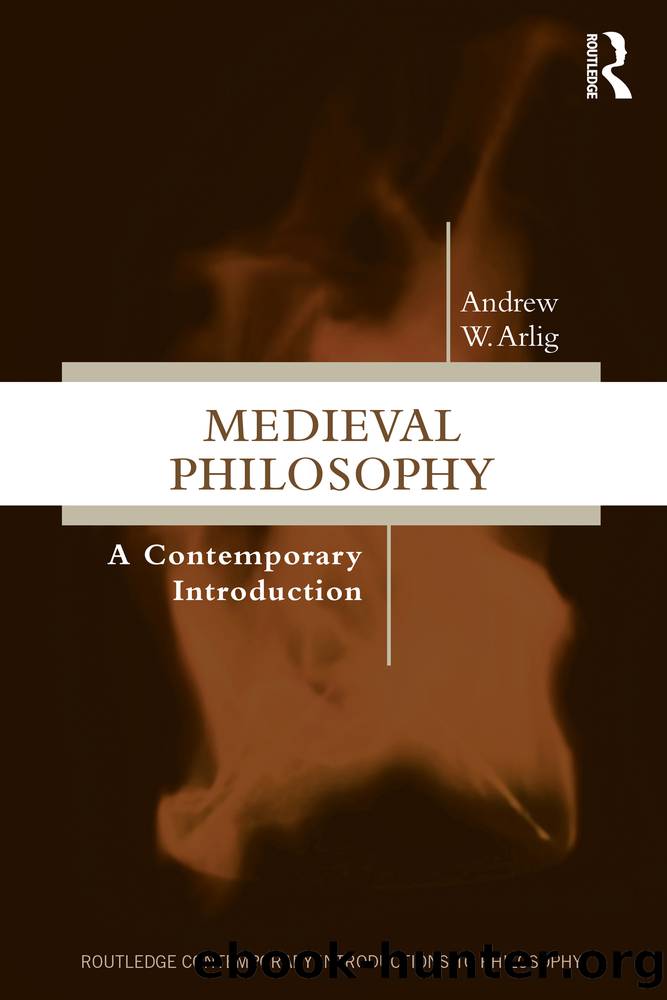Medieval Philosophy by Andrew W Arlig;

Author:Andrew W Arlig;
Language: eng
Format: epub
Publisher: Taylor & Francis (Unlimited)
Published: 2023-05-09T00:00:00+00:00
I have said that the technical notion of an âinfusedâ virtue is something that we see most clearly in Western scholasticism. But notice the affinities between Aquinasâs reasoning here and al-Ghazaliâs account of how we are able to escape from skepticism and move forward with certainty (Section 2.3). Both of them argue that at some point, if left on our own, we will get stuck. We wonât have the confidence and conviction to embrace the starting points of an intellectual investigation, and as Aquinas notes here, we wonât have the motivation to persist on the path of righteousness. God needs to swoop in and tinker with our souls, so that the dim becomes clear and the indifferent or even undesirable becomes the only thing to aim at.
Here I can only gesture at a huge debate that develops in scholasticism between the so-called intellectualists and the so-called voluntarists. (These labels, incidentally, are given by contemporary scholars who study these debates. I know of no scholastic who used these labels.) Aquinas seems to be claiming that God makes it so that my will sees that the only rational way forward is to aim at God and God alone. This comes very close to entailing that reason forces or compels the will to choose the path toward God. (Compare this to what we said about certainty in Chapter 2, especially in Section 2.2.) Other scholastics thought that this was tantamount to God undermining our free will. John Duns Scotus (1308) and others stressed the importance of the freedom of the will. The will is so free, they thought, that it could even make the obviously irrational choice.3
Let that suffice for a brief tour of medieval Aristotelian thinking about the virtues. We can already see how the Aristotelian focus on virtues as the development of potentialities that we have due to what and how we are, helps these philosophers distinguish those aspects of human beings that are distinctive of humans from those aspects that we share with other creatures. Like all plants and animals, we take in water and nutrients, we metabolize them, and we perpetuate the species through the act of reproduction. Like other animals, we move about, which requires that we have sense organs. Some higher-order animals even seem to have memory, which allows them to solve practical problems and to be trained. According to Aristotle, what sets us apart from all other embodied animate creatures is our capacity to reason, and in particular, to reason theoretically. As we will see below, the capacities that make us distinctive as human beings, will give us crucial information when it comes to identifying the way of life that will be most meaningful for us.
But before we turn to that, let me make a couple of brief observations about how Aristotelian virtue ethics differs from many of the dominant contemporary ways of thinking about ethics.
Many philosophers nowadays, following an argument associated most famously with the British philosopher G. E. Moore (1873â1958), think that you cannot derive ethical insights from natures.
Download
This site does not store any files on its server. We only index and link to content provided by other sites. Please contact the content providers to delete copyright contents if any and email us, we'll remove relevant links or contents immediately.
| Ancient & Classical | Arthurian Romance |
| Beat Generation | Feminist |
| Gothic & Romantic | LGBT |
| Medieval | Modern |
| Modernism | Postmodernism |
| Renaissance | Shakespeare |
| Surrealism | Victorian |
4 3 2 1: A Novel by Paul Auster(12392)
The handmaid's tale by Margaret Atwood(7764)
Giovanni's Room by James Baldwin(7346)
Asking the Right Questions: A Guide to Critical Thinking by M. Neil Browne & Stuart M. Keeley(5775)
Big Magic: Creative Living Beyond Fear by Elizabeth Gilbert(5772)
Ego Is the Enemy by Ryan Holiday(5450)
The Body: A Guide for Occupants by Bill Bryson(5097)
On Writing A Memoir of the Craft by Stephen King(4944)
Ken Follett - World without end by Ken Follett(4732)
Adulting by Kelly Williams Brown(4574)
Bluets by Maggie Nelson(4556)
Eat That Frog! by Brian Tracy(4540)
Guilty Pleasures by Laurell K Hamilton(4449)
The Poetry of Pablo Neruda by Pablo Neruda(4109)
Alive: The Story of the Andes Survivors by Piers Paul Read(4033)
White Noise - A Novel by Don DeLillo(4010)
Fingerprints of the Gods by Graham Hancock(4004)
The Book of Joy by Dalai Lama(3986)
The Bookshop by Penelope Fitzgerald(3853)
